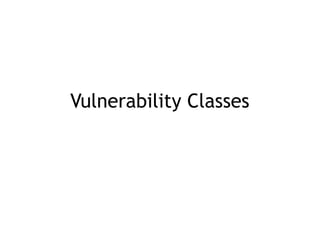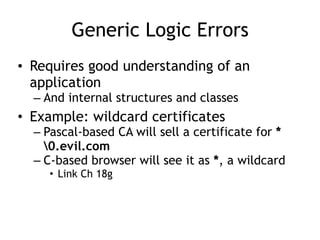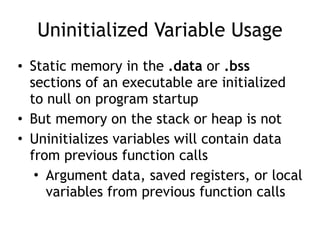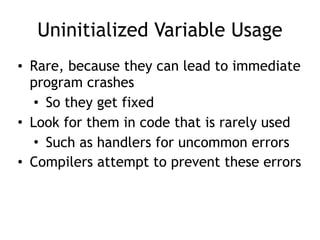CNIT 127: Ch 18: Source Code Auditing
- 1. CNIT 127: Exploit Development Ch 18: Source Code Auditing Updated 4-10-17
- 2. Why Audit Source Code? • Best way to discover vulnerabilities • Can be done with just source code and grep • Specialized tools make it much easier
- 3. Cscope • A source code browsing tool • Useful for large code trees, such as the whole Linux kernel • Many useful search functions • Cbrowser: GUI front-end • Links Ch 18a, 18b
- 4. Ctags • Indexes source code • Creates a tag file with locations for language tags in files scanned • Works in many languages, including C and C++ – Link Ch 18c
- 5. Text Editor • Vim and Emacs have features that make writing and searching though large amounts of code easy • Bracket-matching: find matching ([{
- 6. Automated Source Code Analysis Tools
- 7. Splint • Badly out-of date (last revised in 2007) • Output a little hard to understand – Links Ch 18d, 18e
- 8. • Many available, specialized by language • Link Ch 18f
- 9. • Easy to use • Finds about half the obvious vulnerabilities we've exploited
- 10. Heap Overflow
- 11. Finds Some Vulnerabilities • But not the overflow!
- 12. Format String Vulnerability • It doesn't find it at all!
- 13. Flawfinder • Much better • In Kali • apt-get update • apt-get install flawfinder
- 14. Methodology
- 15. Top-Down (Specific) Approach • Search for specific lines of vulnerable code, such as format string errors • Auditor doesn't have to understand application in depth • Misses vulnerabilities that span more than one part of the code
- 16. Bottom-Up Approach • Auditor reads large portion of code • Starting at main() • Time-consuming but can reveal subtle bugs
- 17. Selective Approach • Most auditors use this approach • Locate code that can be reached with attacker-defined input • Focus energy on that code • Learn the purpose of that code thoroughly
- 19. Generic Logic Errors • Requires good understanding of an application – And internal structures and classes • Example: wildcard certificates – Pascal-based CA will sell a certificate for * 0.evil.com – C-based browser will see it as *, a wildcard • Link Ch 18g
- 20. (Almost) Extinct Bug Classes • Unbounded memory copy functions – strcpy(), sprintf(), strcat(), gets(), … • Hunted nearly to extinction
- 21. Root Cause (from Microsoft)
- 22. Bypassing ASLR & DEP
- 23. Format Strings • Easy to find with a code audit – Although cppcheck failed • Often found in logging code • Vulnerable only if attacker controls the format string
- 24. Generic Incorrect Bounds-Checking • Coder attempts to check limits, but does it incorrectly • Example: Snort RCP Processor (2003) – Processes a series of RPC fragments – Checks each fragment to make sure it's not larger than the buffer – But it should check the total size of all combined fragments
- 25. Snort RCP Processor (2003)
- 26. Loop Constructs • Coders often use intricate loops, and loops within loops • Complex interactions can lead to insecurities • Led to a buffer overflow in Sendmail • Link Ch 18h
- 27. Demonstration Exploit • Link Ch 18i
- 28. Off-by-One Vulnerabilities • Often caused by improper null- termination of strings • Frequently found in loops or introduced by common string functions • Can lead to arbitrary code execution
- 29. Example from Apache • When both if statements are true – Space allocated is one byte too small – memcpy will write one null out of bounds
- 30. OpenBSD ftp Daemon • If last character is a quote, it can be written past the bounds of the input buffer
- 31. strncat() • Strncat always null-terminates its output string • Will write a null byte out of bounds unless the third argument is equal to the remaining space in the buffer minus one byte
- 32. Non-Null Termination Issues • If a string is not terminated with a null – Memory after the string is interpreted as part of the string – May increase length of string – String writes may corrupt memory outside the string buffer – Can lead to arbitrary code execution
- 33. strncpy() • If there's not enough space in the destination buffer – strncpy() won't null-terminate the string it writes
- 34. strncpy() Example – First strncpy won't null-terminate not_term_buf – Second strcpy is unsafe, even though both buffers are the same size – Fix it by adding this line of code after the first strcpy
- 35. Skipping Past Null-Termination • String-processing loops that process more than one character at a time – Or where assumptions about string length are made • Can make it possible to write past end of a buffer – Possible arbitrary code execution
- 36. Example from Apache • This line is intended to skip past :// in a URL – cp += 3
- 37. But Not All Schemes End in :// • If the URI is ldap:a – The null byte is skipped
- 38. Signed Comparison Vulnerabilities • Coder attempts to check input length • But uses a signed integer variable • Or two different integer types or sizes – C sometimes converts them both to signed integers before comparing them • Following example from Apache – Led to code execution on Windows and BSD Unix
- 39. Example from Apache • bufsize is a signed integer – Remaining space in the buffer • r->remaining is signed – Chunk size from the request • len_to_read should be the smaller of the two – Negative chunk size tricks the code into performing a large memcpy later, because it's cast to unsigned
- 41. • Link Ch 18l
- 42. • A hashed password can begin with 0e and contain only digits (very rare) – Like 0e12353589661821035685 • PHP reads that as scientific notation – 0^123… – Always zero (link Ch 18j)
- 43. Double Free Vulnerabilities • Freeing the same memory chunk twice • Can lead to memory corruption and arbitrary code execution • Most common when heap buffers are stored in pointers with global scope • Good practice: when a global pointer is freed, set it to Null to prevent it being re- used • Prevents dangling pointers
- 44. Out-of-Scope Memory Usage Vulnerabilities • Use of a memory region before or after it is valid • Also called "Dangling Pointer" – Image from Wikipedia • Link Ch 18k)
- 45. Uninitialized Variable Usage • Static memory in the .data or .bss sections of an executable are initialized to null on program startup • But memory on the stack or heap is not • Uninitializes variables will contain data from previous function calls • Argument data, saved registers, or local variables from previous function calls
- 46. Uninitialized Variable Usage • Rare, because they can lead to immediate program crashes • So they get fixed • Look for them in code that is rarely used • Such as handlers for uncommon errors • Compilers attempt to prevent these errors
- 47. Example • If data is null – test is never assigned any value – But test is still freed
- 48. Exploitation • The "uninitialized" data in test is not random • It comes from previous variables and function calls • It may be controlled by the attacker • So the free() leads to a controllable memory write – Arbitrary code execution
- 49. Use After Free Vulnerabilities • Heap buffers are temporary – Released with free() • But a program may use a pointer after free() – If more than one variable points to the same object • Allows an attacker to write to RAM – Possible arbitrary code execution
- 50. Multithreaded Issues and Re-Entrant Safe Code • A global variable is used by more than one thread, without proper locking – A variable might be changed unexpectedly by another thread • Such issues won't appear until the server is under heavy load – May remain as intermittent software bugs that are never verified


















































